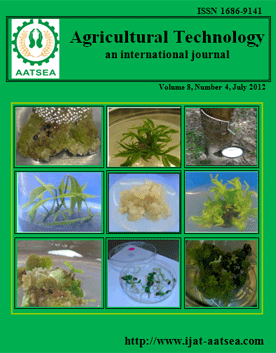ThaiScience
ThaiScience
INTERNATIONAL JOURNAL OF AGRICULTURAL TECHNOLOGY
Volume 17, No. 01, Month JANUARY, Year 2021, Pages 237 - 256
Strategies adopted by maize farmers to minimize post-harvest losses in delta state, nigeria
Ovharhe, O. J., Emaziye, P. O., Okpara, O., Agoda, S. and Benson, C. O.
Abstract Download PDF
The study assessed the strategies which is adopted by maize farmers to minimize post-harvest losses in Delta State, Nigeria. The results showed that major causes of post-harvest losses were inadequate awareness of modern storage facilities ( ̅ = 3.74). Respondents experienced post-harvest losses on a maximum level at storage structure ( ̅ = 3.64). It was noticed that there were poor extension activities and visits ( ̅ = 0 .26) and zero beneficiaries of incentives for storage activities from the government ( ̅ = 0.00). One of the most effective strategies adopted to minimize post-harvest losses was the use of bags for storage ( ̅ = 3.06). A high degree of mean constraints was the limited capacity of institutional support to post-harvest activities ( ̅ = 3.78) and the use of less efficient processing technology ( ̅ = 3.73). Results revealed that significant relationship (p<0) exit among marital status, education and age of respondents and perceived strategies to minimize post-harvest losses among maize farmers. It was concluded among other factors that poor extension activities affected post-harvest management and the sorting of grains was a better strategy adopted to minimize post-harvest losses.
Keywords
Extension, Maize, Post-harvest, StorageINTERNATIONAL JOURNAL OF AGRICULTURAL TECHNOLOGY
Published by : Association of Agricultural Technology in Southeast Asia (AATSEA)
Contributions welcome at : http://www.ijat-aatsea.com
